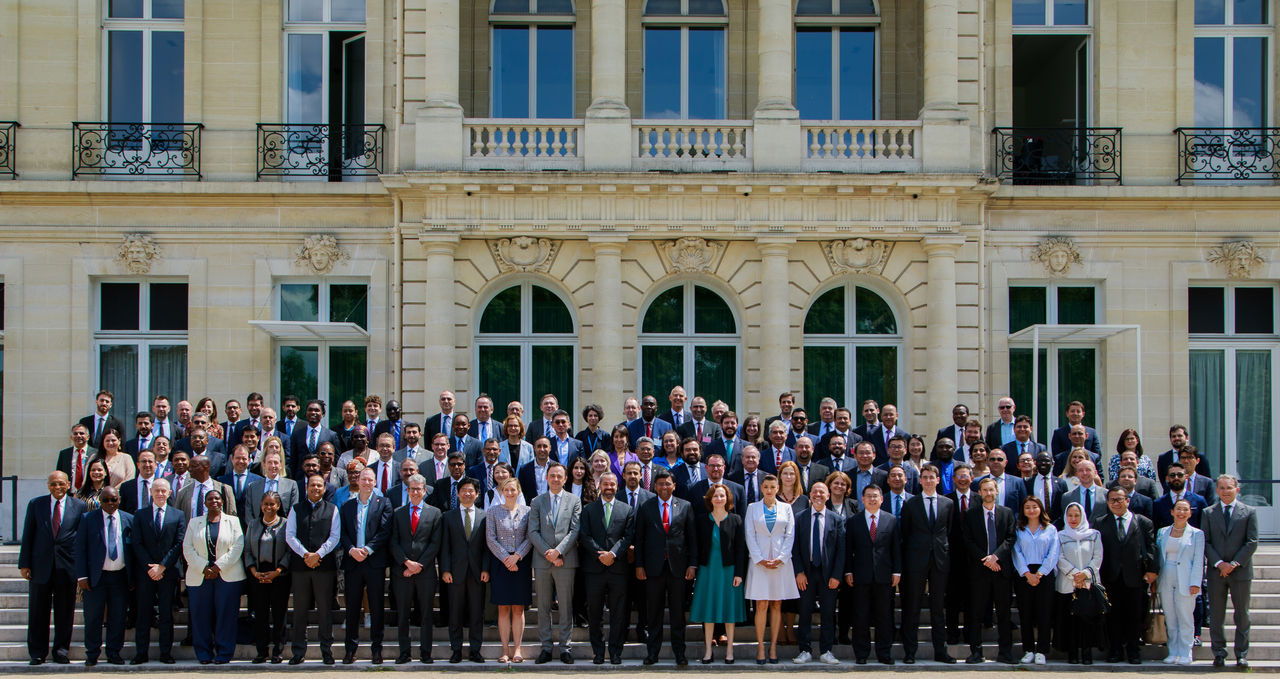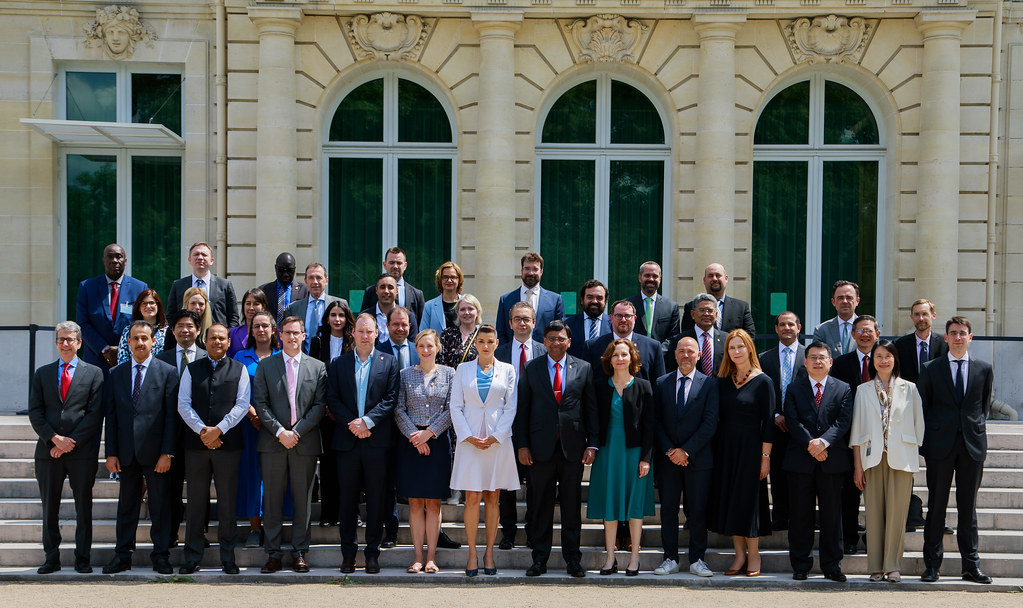Paris, 23 June 2023 - The third Plenary of the FATF under the Presidency of T. Raja Kumar of Singapore concluded today. Delegates from over 200 jurisdictions of the Global Network and observers from international organisations participated in these discussions at the FATF headquarters in Paris. The fight against money laundering and the financing of terrorism and proliferation requires a global response. For that reason, it is crucial that all countries in the Global Network take collective action to address these risks. These important issues were discussed at the FATF-FSRB Annual High-Level Meeting which preceded the FATF Plenary meeting.
The FATF reiterates its deepest sympathies to the people of Ukraine for the needless loss of life and destruction of infrastructure and society as a result of the Russian Federation’s ongoing military invasion of Ukraine. The Russian Federation’s war of aggression against Ukraine continues to run counter to FATF’s principles of promoting security, safety and the integrity of the global financial system and the commitment to international cooperation and mutual respect upon which FATF Members have agreed to implement and support the FATF Standards. The suspension of the membership of the Russian Federation continues to stand.
Following the statements issued since March 2022, the FATF reiterates that all jurisdictions should be vigilant to current and emerging risks from the circumvention of measures taken against the Russian Federation in order to protect the international financial system.
FATF Members agreed to publish the fourth targeted update on the implementation of the FATF Recommendations on virtual assets and virtual asset service providers. FATF Members also advanced the work on preventing the misuse of non-profit organisations (NPOs) and agreed to release for public consultation potential revisions to Recommendation 8 and the updated FATF Best Practices paper on combating the abuse of NPOs.
FATF members were updated on the progress of ongoing work, including projects on the misuse of citizenship and residency by investment schemes, money laundering and terrorist financing related to cyber-enabled fraud, and on the use of crowdfunding for terrorist financing. The Plenary also discussed potential enhancements to its Recommendations 4 and 38, to provide countries with stronger legal measures to freeze, seize and confiscate criminal property and property of corresponding value, including non-conviction based confiscation. The FATF expects to complete these projects in October 2023. FATF Members also agreed on new projects, including a project to enhance money laundering investigations and prosecutions
The Plenary thanked outgoing Vice-President Elisa de Anda Madrazo of Mexico for her service, and welcomed Jeremy Weil of Canada, who will succeed her on 1 July 2023.
Compliance with the FATF Standards
Mutual Evaluation of Luxembourg
The FATF discussed and adopted the mutual evaluation report of Luxembourg which assessed the effectiveness of that country’s measures to combat money laundering and terrorist financing, and their compliance with the FATF Recommendations.
The Plenary concluded that Luxembourg has reached a high level of technical compliance with the FATF’s requirements and its AML/CFT regime is delivering good results. Luxembourg has achieved a good understanding of the money laundering and terrorist financing risks it faces, particularly important given its status as a regional and international financial centre. The country achieved robust domestic co-operation and co-ordination at both policy and operational levels, including in the use of financial intelligence and access to beneficial ownership information, and constructive cooperation with its international counterparts. Luxembourg needs to focus on strengthening its measures in certain areas, including improving the detection, investigation and prosecution of more complex money laundering cases, in line with the country’s risk profile. Luxembourg should also strengthen the risk-based supervision of its non-financial sector, further develop and disseminate its understanding of terrorist financing risks to both the public and private sectors and apply proportionate and dissuasive sanctions for non-compliance to its financial and non-financial sectors.
The FATF will publish the report by September after the FATF’s quality and consistency review is completed.
High-risk and other monitored jurisdictions
Jurisdictions under Increased Monitoring
Jurisdictions under increased monitoring are actively working with the FATF to address the strategic deficiencies in their regimes to counter money laundering, terrorist financing and proliferation financing. When the FATF places a jurisdiction under increased monitoring, it means the country has committed to implement an Action Plan to resolve swiftly the identified strategic deficiencies within agreed timeframes. New jurisdictions subject to increased monitoring are Cameroon, Croatia and Vietnam
Jurisdictions subject to a call for action
FATF identifies countries or jurisdictions with serious strategic deficiencies to counter money laundering, terrorist financing, and proliferation financing. These jurisdictions are subject to a call for action to protect the international financial system. No new countries/jurisdictions were added to this list.
5th Round of FATF Mutual Evaluations
FATF members continued their preparations for the fifth round of mutual evaluations. This includes developing the Universal Procedures that will apply to all assessments conducted in the next round, regardless of the assessment body in charge. Delegates heard updates on the assessor training programme that aims to ensure that each mutual evaluation in the next round is carried out by a fully trained assessment team of experienced AML/CFT experts.
The FATF also discussed the preparation by the FSRBs for the next round of mutual evaluations.
Strategic initiatives
FATF Targeted Update on Implementation of the FATF Standards on Virtual Assets/VASPs
Four years after the FATF strengthened its standards to address virtual assets and virtual asset service providers, global implementation of these measures remains relatively poor. Based on FATF mutual evaluation and follow-up reports, almost three quarters of jurisdictions are only partially compliant or not compliant with the FATF’s requirements. Many jurisdictions have not yet implemented fundamental requirements, and more than half of survey respondents have not taken any steps towards implementing the Travel Rule, a key FATF requirement to prevent funds being transferred to sanctioned individuals or entities. This lack of regulation creates significant loopholes for criminals to exploit. Closing the gaps in global regulation of virtual assets is an urgent priority. The FATF calls on all countries to apply the AML/CFT rules to virtual assets service providers, without further delay.
On 27 June, the FATF will publish a report urging countries to swiftly implement the FATF’s Recommendations on virtual assets and VASPs, including the Travel Rule, to close these loopholes. The report also highlights emerging risks, including from DPRK’s illicit virtual asset-related activities, which are used to finance their WMD programme, as well as from decentralised finance, and peer-to-peer transactions.
The FATF will continue to drive global compliance and in the first half of 2024 will publish a table showing what steps FATF member jurisdictions and other jurisdictions with materially important VASP activities have taken towards implementing Recommendation 15.
FATF Asset Recovery
The FATF has continued its work to revise the FATF Standards relating to asset recovery in line with its priority to strengthen countries’ measures to deprive criminals of their ill-gotten gains. The FATF aims to provide a new suite of tools which countries should use to effectively freeze, seize, and confiscate criminal property, both domestically and through international cooperation. A key milestone was reached at this Plenary to advance the reforms, which the FATF aims to approve in full in October 2023 related to Recommendations 4 and 38.
FATF Work to Combat Corruption
The FATF’s work makes a valuable contribution to the fight against corruption that complements the work of other international bodies in that area. The Plenary adopted an internal tool to facilitate assessment of Recommendation 36, which requires countries to implement relevant articles of the United Nations Convention Against Corruption (UNCAC), to improve the consistency of these assessments across the Global Network. FATF members were also updated on the progress of ongoing work on the misuse of citizenship and residency by investment schemes, which will also make a valuable contribution to anti-corruption work.
Unintended Consequences of the Incorrect Implementation of the FATF Standards
Since 2021 the FATF has focused on mitigating the unintended consequences of incorrect or inconsistent implementation of the FATF Recommendations, which can lead to de-risking, financial exclusion and the undue targeting of NPOs.
Combating the Abuse of NPOs for Terrorist Financing
In October 2021, the FATF completed its first stock-take and analysis phase of unintended consequences and decided to undertake several streams of further substantive work, including potential policy development, in the relevant working groups. At this Plenary, delegates discussed progress of that work, including potential revisions to Recommendation 8, which aims to protect NPOs from potential terrorist financing abuse. The revisions will seek to address the problem of over-application of preventive measures to the NPO sector in some countries, recognising the negative impact this can have on legitimate NPO activities.
Delegates also discussed an update of the FATF Best Practices Paper on Combating the Abuse of Non-Profit Organisations. The updated best practices paper aims to help countries, financial institutions and NPOs effectively implement risk-based measures to protect NPOs from potential TF abuse, without disrupting or discouraging legitimate NPO activities.
The Plenary agreed to release the revised best practices paper and the potential revisions to Recommendation 8 for public consultation. Both are the result of extensive consultation with stakeholders, including with the private sector and civil society at the Private Sector Consultative Forum held in May. The FATF welcomes further views on this issue and expects to finalise this work at its October 2023 Plenary meeting.
Assessing Unintended Consequences
The FATF’s mutual evaluation process plays a crucial role in identifying and addressing the incorrect implementation of the FATF Recommendations. The Plenary agreed on amendments to the Methodology for the 5th round of mutual evaluations which was adopted in March 2022. The amendments will ensure that each assessment in the next round considers unintended consequences, specifically the incorrect implementation of the FATF Recommendations.
FATF Vice-Presidency
The Plenary thanked outgoing Vice President Elisa de Anda Madrazo of Mexico for her strong commitment to the fight against money laundering, terrorist financing and proliferation financing, her astute leadership including on FATF’s response to unintended consequences, and her invaluable contributions to the FATF.
The FATF welcomed her successor Jeremy Weil of Canada, who will assume the role on 1 July.



 Twitter
Twitter
 Facebook
Facebook
 Instagram
Instagram
 Linkedin
Linkedin
